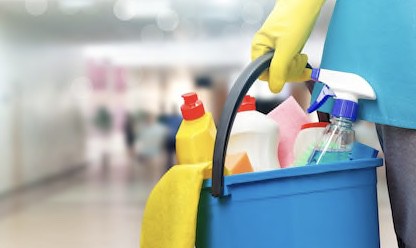As consumers, we’re always on the look-out for the wonder product. We want a commercial cleaning product that kills bacteria, leaves a pleasant scent, makes every surface sparkle, and costs pennies on the dollar. Remember that movie, My Big Fat Greek Wedding? In it, the father uses window cleaner for everything. Common ailments, sores, cleaning…whatever the problem- this product can solve it. It may be a funny anecdote in a film but it’s also become a reality in our lives.
We want big results with very little effort. Just like Hydroxycut isn’t going to get you shredded without an appropriate diet and workout regimen, there’s a lot of work we have to place behind the wonder products that their labels fail to mention. Today, we are going to look at a few commercial cleaning products that could be making their way onto your radar, why they don’t clean as well as they claim, and how to have a peace of mind without them.
Cleaning Wipes
Cleaning Wipes have become incredibly popular in the last 10 years or so. They’re the biggest star in the realm of commercial cleaning products and are regularly included on a student’s Back-to-School supply list, are present in more than 60% of American homes, and claim to kill 99.9% of all viruses and bacteria. Cleaning has become synonymous with convenience. We are being good stewards of our money and resources and are doing a better job at protecting our families, children, and patrons…
Except we’re not.
Disinfectant wipes are notoriously bad for transferring bacteria between surfaces instead of killing it. Not only that, they contain some pretty harsh chemicals that have been linked to skin and eye irritation, lung and asthma-related illnesses, and other adverse health problems.
The Food and Drug Administration (FDA) admits that there is no evidence to support that cleaning with disinfectants is better than the use of good ole soap and water.Studies have even shown that the overuse of wipes can lead to antibacterial-resistant bacteria called “superbugs” which can create a dangerous environment for everyone.
Stop turning to convenience for your cleaning methods. Instead, place your bets on companies that have devoted the time and resources to providing safe and effective cleaning measures.
Companies like Hillyard have invested in green cleaning measures for large facilities all while keeping consumer health and safety at the forefront of their work. Partner those products with paper towels (link: The Best Cleaning Tool You Already Have) to stop the transfer of bacteria and germs and you’ll rest easy knowing you’ve done everything possible in protecting those around you.
Disinfectant Spray
Much like the beloved Cleaning Wipes, disinfectant sprays are just as hazardous to our health and safety. If not more. Again, these products claim to kill 99.9% of germs and bacteria but did you know that the EPA also classifies the most popular brand of spray as a pesticide?
The health effects are staggering. Disinfectant sprays have been linked to respiratory problems, developmental issues like ADHD and Autism, as well as causing issues to our endocrine and reproductive systems. So is killing a cold virus worth all of this? Absolutely not. Especially when there are proven safe and effective methods to combat bacteria and germs.
Instead of running to the supermarket for your disinfectants and cleaning products, run to the kitchen. Soap and water is a great solution to fight against germs and bacteria. A 3% solution of Hydrogen Peroxide is deemed a stable disinfectant by the CDC. White vinegar is a safe alternative to bleach and has a great environmental profile as well as being cost effective. In short, your cleaning dilemma might be solved with some things already tucked away in your cupboards. You can get the same clean, or better, without all the health risks.
Window Cleaner
Oh yes, Papa’s favorite cure-all from My Big Fat Greek Wedding. It gives us streak-free windows, smells clean, and makes us a believer every time we look into a freshly cleaned piece of glass or mirror.
However, the active ingredient in window cleaner is ammonia. Like the products above, these sorts of commercial cleaning products have been linked to various health issues such as respiratory problems, skin and eye irritation, and has even been associated with long-term effects such as cancer. Not only that, there are other chemicals in that blue liquid that pose even greater health risks and become poisonous if combined with bleach.
Vinegar is a great solution. Not only is it cost effective, it’s environmentally friendly. With vinegar you no longer have to worry about all the health concerns. Even though the smell can be a bit abrasive, it evaporates quickly and will give you the streak-free goodness you’re looking for.
In the end, consumer products have great slogans, incredible marketing, and give us the promise of convenience. But the truth is that the data isn’t there. These commercial cleaning products may sound great on paper but they’re simply a mix of chemicals that have the potential to do more harm than good.
Look for safety, not convenience. Invest in a solution or janitorial team that is geared toward green cleaning products. They may cost a little more but that’s because quick, efficient, and cheap is usually a lie.
Unless it’s vinegar. You can always count on vinegar.

Trackbacks/Pingbacks